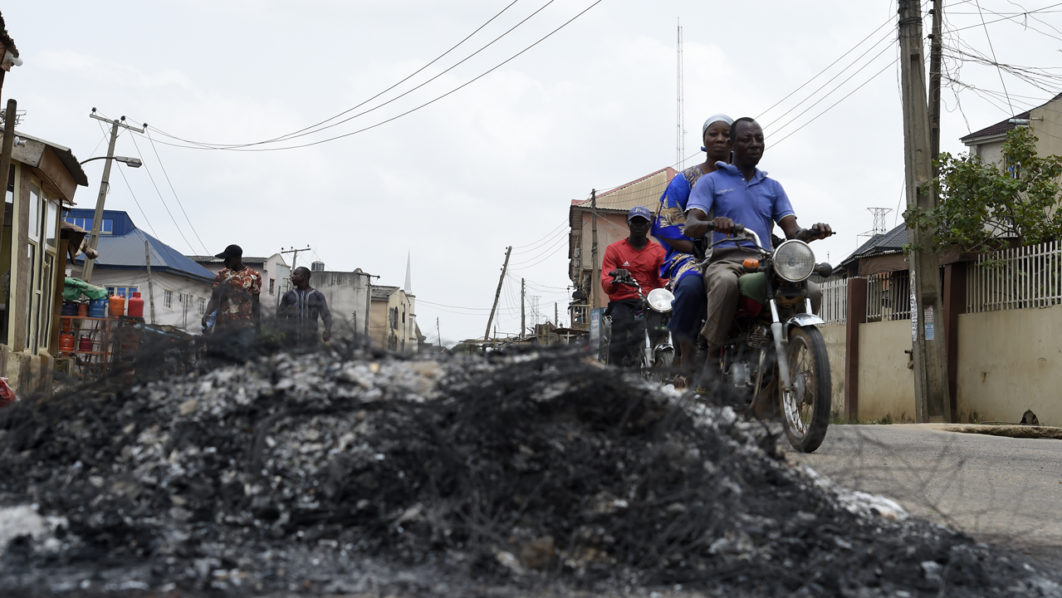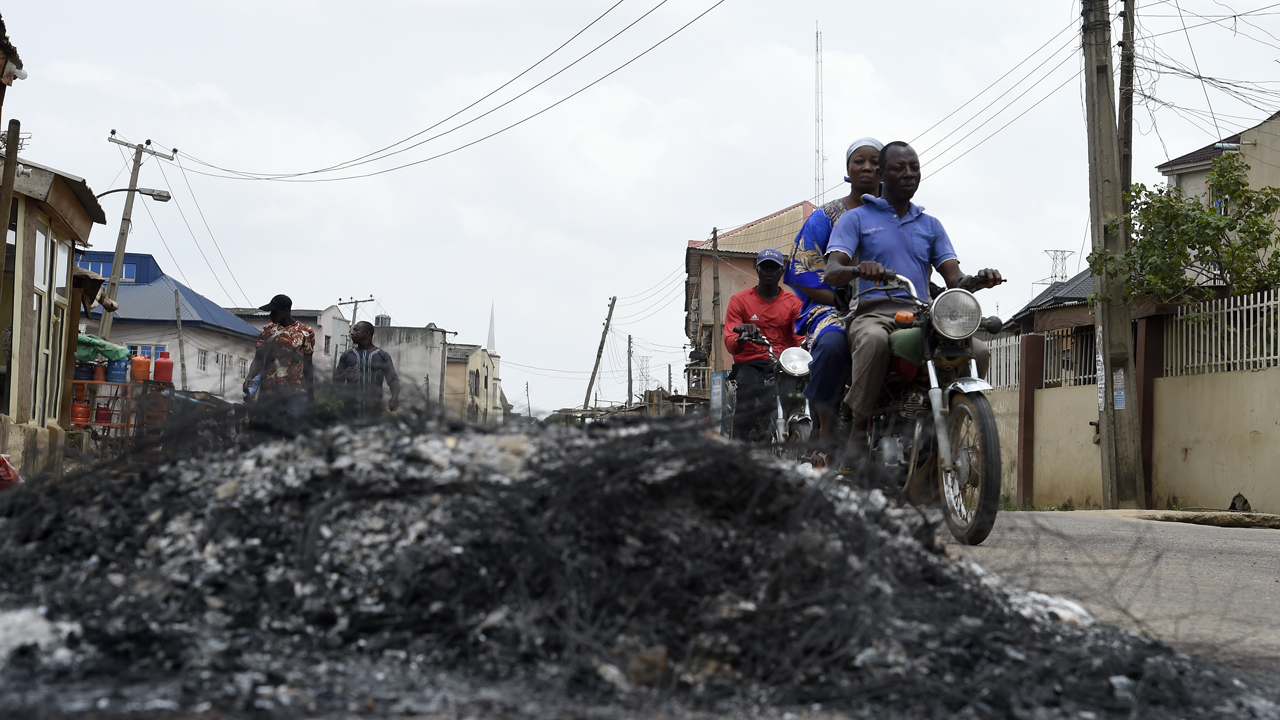[dailymotion code=”undefined” autoplay=”yes”]
• Experts urge NSA to strategise against the menace
• Caution against freeing hardened criminals
• Seek massive investment in the police system
Security experts have predicted that following the crippling of businesses by the lockdown over the coronavirus outbreak, the crime rate may soar across the country after the pandemic.
A former Department of State Services (DSS) boss, Dennis Amachree, said that the fallouts of the lockdown in its first two weeks, especially in Lagos, were indications that there would be a spike in criminal activities during and immediately after the COVID-19 lockdown.
According to him, “criminals will take advantage of the inadequate number of law enforcement resources to perpetrate property and violent crimes in the commercial corridors. The criminals will stay away from housing and residential areas because everyone is at home, but let us not lose sight of cases of domestic violence that have already started to be a cause for concern.”
To Amachree, who is the chief executive officer of Zoomlens Security Solutions, there is a high probability that those released from jail by the federal and state governments to check the spread of coronavirus may regroup to form gangs.

“The reason is that the criminals were not released on bail, they were let loose to mix freely in society.They must have perfected whatever crime that got them into prison, and with a bitter mindset against the society, they will be ready to unleash hate and violence upon innocent citizens.
“Remember that the prisons in Nigeria are not correctional, although the name was recently changed. These inmates tend to acquire more dangerous habits before they finish serving their terms. There is also no means to electronically monitor them, but records will show that some of these released prisoners will soon find their way back into prison in the near future.
“The government should be sincere and learn the lessons that this pandemic has presented to the whole world. Nigeria should invest in its police. Let it not be business as usual. Recruit the right people, train them to meet new challenges that the new world order directs, remunerate them well and the government should provide leadership in playing within the rule of law.
“This way, crimes will not only be checked but prevented proactively in our society. The world after COVID-19 will be different from the way we use to know it,” the expert said.
A United States of America (USA) trained air force intelligence officer, Mrs. TanwaAshiru, holds the same opinion.
Ashiru recalled that prior to the announcement of the lockdown, there were security advisories that warned about the possibility of increased criminal activities, especially armed robbery and gang violence.
She said: “That is exactly what Lagos State experienced during this lockdown. Now there are speculations about the increase in the crime rate after the lockdown, to stem from the economic impact of the lockdown caused by COVID-19. Of most importance will be the likely increase in unemployment, which will see more people become desperate to feed themselves and their families. This desperation for survival often leads to increased crime.
“It is important to note that the Federal Government selected a demographic of inmates that they feel would pose less of a threat to society, once released from prison. These include inmates who are 60 years old and above, those suffering from ill health that could be terminal, inmates serving three years and above and have less than six months left to serve, inmates with mental issues, and those with options of fine not exceeding N50, 000.
“Either way, inmates released may contribute to an increase in crime because of the same issue of unemployment raised in the previous question. When it is difficult for educated graduates with clean records to find jobs, it will be 10 times more difficult for persons with criminal records. Again, some of them may resort to crime as a means of survival.
“Other factors that could lead to increase in crime among former inmates include lack of proper tracking of inmates and citizens in general, widespread weapon proliferation across the nation, and poor law enforcement presence across the states.”
According to Ashiru, “Studies have shown that economic stress causes an increase in criminal behaviour. If the government wants to reduce crimes in post-COVID-19, it must focus on improving the nation’s economy. Steps towards this will include encouraging banks to provide loans to small and medium-sized companies to prevent widespread layoffs, reduce our dependency on oil and encourage growth in other industries, especially those that will lead to the creation of more jobs.
“Aside from these, the government must seriously consider short-to-medium term relief packages for those that need them the most. However, for a country with a burgeoning population and a struggling economy, there is no doubt that Nigeria is in for some tough times ahead. In other words, crime will increase with the government attempts to restore the economy.
“Therefore, it is important that the Office of the National Security Adviser (ONSA) immediately have a plan in place for security agencies to respond to crime and emergencies. This plan should focus on redeploying government security agencies with adequate resources to hotspots with an appropriate ratio of law enforcement personnel to the population in the area”.
To security analyst, Christopher Oji, it would be an understatement to say that crime would increase after the lockdown.
“The right statements are that it will escalate in geometric progression. First, the economy is already in a mess; now that COVID-19 has rendered many businesses incapacitated, many people are going to lose their jobs. With the banning of commercial buses, tricycles and motorcycles in states, especially Lagos, we are in serious trouble. Over 2000 youths who engaged in transportation have been relieved of their means of livelihood. What are they going to do after the lockdown and where will they get money to feed their families? Really, as Africans, we believe so much in the extended family.
“There are many people who depend on one individual, there will be too much pressure on those who have already lost their jobs. People must eat and like we are told, a hungry man is an angry man and he that is down needed fear no fall. The man who is out of a job must do anything to survive and the next thing in mind is a crime. The government is still compounding the issue by the order for correctional centres across the country to release inmates who have minor offences hanging on their necks; those on awaiting trials for a certain period of time and those with health challenges. Already, the federal correctional centres have released about 3000 inmates.
“All the 36 states and FCT Abuja are compiling lists of inmates to be released. This is going to compound the challenge of crime-fighting in the country. The investigation has revealed that criminals don’t change. Those hardened criminals will form formidable gangs that will put serious pressure on our security agents. The government should do something urgently to check crime. They should look into the issue of unemployment with the utmost urgency. The lockdown should not be extended unnecessarily so that the economy will not be grounded. The government should look beyond oil and do other business that will engage our teeming jobless youths.
“The government should give palliative to Nigerians to cushion the effect of hunger that will arise from the lockdown and set up a panel, led by incorruptible judges to vet the inmates that will be released. This is to make sure that those who will be released must have good reasons to be freed. The government should also make sure that they build or expand our correctional centres across the states.
“There should be instant mopping up of arms. The proliferation of arms in the country has reached an embarrassing stage that the agencies that are responsible to man our borders should do something urgently to stop it. Some arms are produced locally; the Nigeria police should go after the manufacturers.”
A certified protection officer, Frank Oshanugor, said the crime rate would increase after Covid-19 because many companies and businesses are not likely to come back fully on stream after the pandemic.
Oshanugor, the chief executive officer of Security Express, said: “I foresee job losses in some companies and this would result in an increased number of unemployed persons. Some of these jobless persons would unavoidably resort to stealing and all sorts of criminal activities that would provide them with the means of livelihood.
“Those who have fears that the freed inmates may regroup and perpetrate crime may not be far from the truth as many of the released inmates may not have truly repented or been corrected in the correctional centres from their criminal tendencies before their release. They may have the urge to go back to the crime immediately after the lockdown as no positive alternative has been provided for them.”
Sustainable development advocate, Laurence Izegbu said if not well managed by government and security experts, post-covid-19 Nigeria would be more tragic than the covid-19 itself.
“The psycho-social aftermath of the coronavirus pandemic, if not properly handled, could surpass the level of tragedy already experienced. Ordinarily, the youths are known to frequently exhibit restive tendencies.
“There is no doubt about the fact that COVID-19 would be brought under control; that is certain. However, no matter how well the coronavirus gets smashed beyond resurgence, the ripple effects are already here with us, and too huge to dismiss. At the end of this pandemic, people would return to the remains of their businesses and relationships.”






